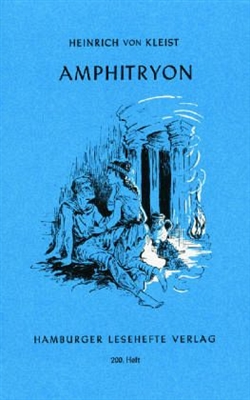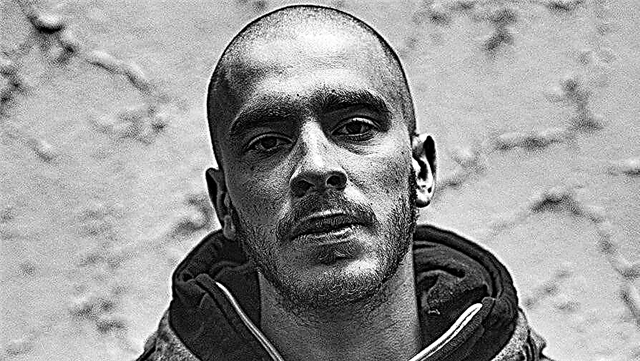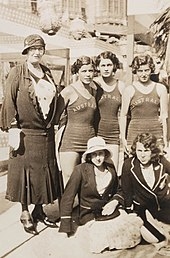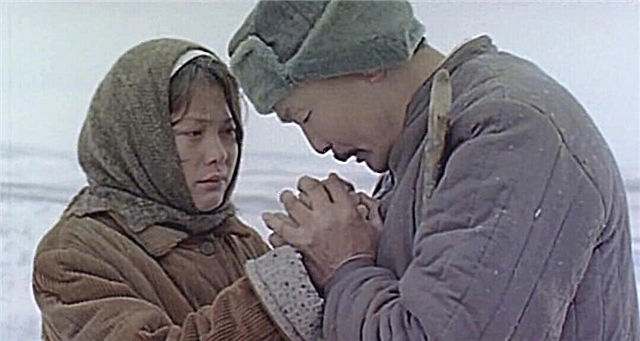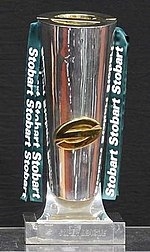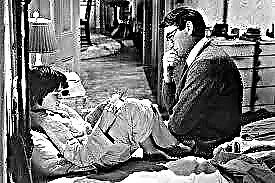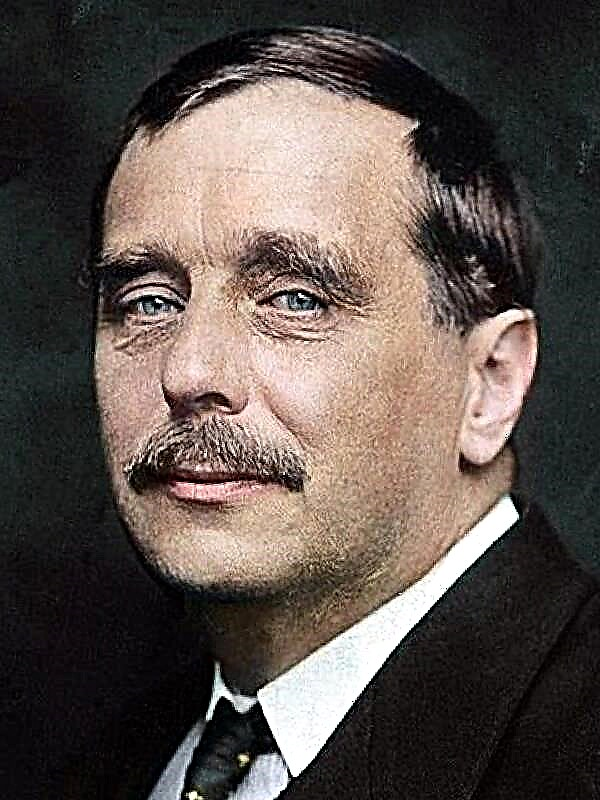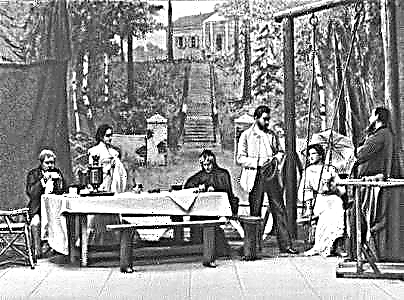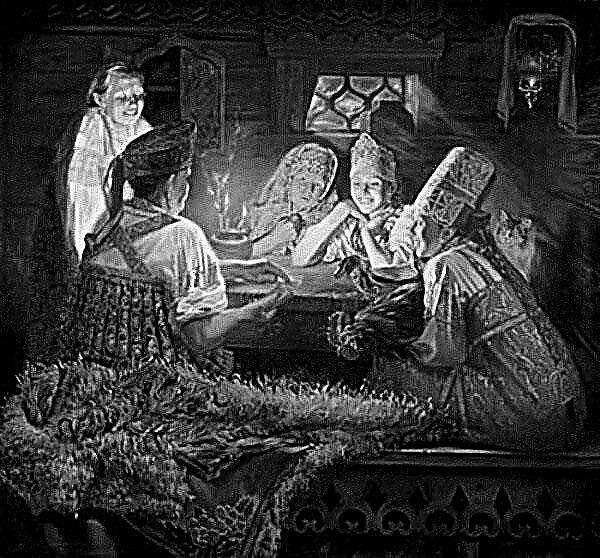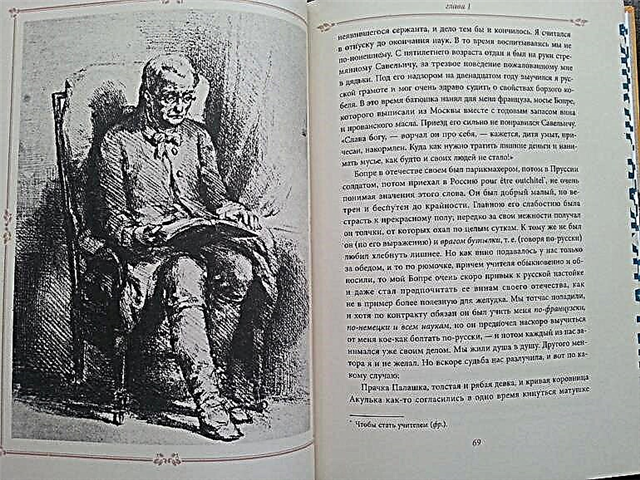The novel begins a series of twenty works dedicated to the Rugon-Makkarov family. By the example of this family, Emil Zola tracks the vices and virtues transmitted by inheritance.
I
Plassant, a town in southern France, early December 1851. In one of the back streets of St. Miter, where there used to be a city cemetery, the young lovers Silver and Mietta met. The young man joined the detachment of revolutionaries, who today had to join the rebel army, and now had to say goodbye to his beloved for a long time.
Thirteen-year-old Mietta lived in the care of her uncle in the large estate of Ja-Meifren, which bordered on the area of St. Miter. The girl’s father, a poacher, defended himself, shot the gendarme, and was now in hard labor. In the city he was called a murderer and a thief. Uncle Mietta made a nurse out of his niece and constantly reproached her with his father. With the departure of Silver, the girl remained completely defenseless. She regretted that she was not born a man.
Silver was raised by his grandmother, and his uncle taught him "love the republic." The remaining relatives did not communicate with the young man. Silver believed that the revolution would bring him and Mietta happiness and freedom.
The lovers walked until the rebels approached Plassan.
Marseillaise filled the sky - as if the giants blew into gigantic trumpets, and the song trembled, clanged with copper, flying from edge to edge of the valley.
The Plassan squad was entrusted with carrying the banner. Wanting to quickly join the comrades, Silver led Mietta into the squad. The working people started screaming for the girl to clean - they do not need the daughter of a thief and a killer. One of the hunters, who once knew her father, stood up for the girl, and the others supported him.
Mietta was taken with them and entrusted to her to carry the banner. The girl was happy that she did not have to part with Silver.
II
Plassan was divided by wide avenues into three blocks - the worker, the bourgeois and the noble. Each quarter was a separate, secluded little world. Even during traditional Sunday walks, the residents of the neighborhoods did not mix, but formed three separate “currents”.
“In this peculiar environment” the history of the Rugon-Makkarov family began. The first of the Rugons, a cunning and prudent peasant, married Adelaide, the half-crazy daughter of a wealthy gardener, who, after the birth of her son Pierre, became even more obsessed and was only interested in sensual pleasures.
Soon the peasant Rugon died. Adelaide got a lover - an uncouth poacher and smuggler nicknamed McCar the tramp, whose poor shack stood in one of the dead ends of St. From him, the widow survived illegitimate children. Son Antoine was prone to drunkenness and laziness, and his daughter was too sensual.
Unlike his brother and sister, Pierre, who inherited a tenacious mind from a peasant father, attended school more or less regularly.
The peasant, realizing the need for education, becomes fiercely prudent.
Soon, the greedy Pierre completely subjugated the crazy mother. He found a way not to share his inheritance with his brother and sister. Having sent Antoine to the army and having married his sister, he forced his mother to sell the land left from the gardening grandfather to the owner of Ja-Meifren. Soon Maccar was killed by customs guards, and Adelaide moved into his shack.
Pierre married Felicite, the ambitious and envious daughter of a half-ruined oil merchant. For thirty years of marriage, Felicite gave birth to three sons and two daughters. The Rugons could not get rich, and the mother directed all her ambition to her sons. Having spent a fortune, she sent them to study in Paris, hoping that there her sons would reach unprecedented heights and make her rich.
Felicite’s dreams did not come true.Her daughters got married and left Plassan, and the sons, having unlearned, returned home. The eldest son, lawyer Eugene, was power-hungry. The younger, Aristide, was distinguished by greed, quarrelsomeness and laziness. He married a very gluttonous girl, and he had to go to work as a petty official in the prefecture.
Only the middle one, Pascal, was not like the Rugonov. He became a doctor and a prominent physiologist. In Plassan, they did not know about Pascal's successes and considered him an eccentric, since he lived ascetically, healed the poor and studied the bodies dug up at the cemetery.
In 1845, the Rugons were tired of fighting and sold their business. Their rent was not enough to maintain their own home, and Pierre and Felicite had to settle in a rented apartment. Looking at the living room with old yellow furniture, Felicite became more and more gallant.
On the eve of the 1848 revolution, Eugene went on guard of good luck to Paris. The rest of the Rugon hid, ready to grab a fortune by the throat.
III
After the February coup of 1848, the yellow Rugon salon began to visit the Marquis de Carnavan. Passan has long been rumored that Felicite is his illegitimate daughter. The Marquis dreamed that France again became a monarchy, and Henry V of the Orleans dynasty was king. In this case, he hoped to regain his fortune and promised to leave everything to Felicite, if she would support him. The rogons instantly became royalists, and a small club appeared in the yellow saloon.
De Carnavan, out of mercy, lived in the house of a relative who forbade driving like-minded people, so the Marquis decided to settle with the Rugons. Officially, the head of the club was Pierre, but in fact everything was controlled by the Marquis, behind whom stood influential people from the clergy.
There are situations from which only people with a tarnished reputation benefit.
In April 1849, Eugene came from Paris and lived with his parents for two weeks, regularly attending all club meetings. Before leaving, he decided to use this bunch of fools, and started a political intrigue, in which so far he devoted only his father - he planned to use too smart mother later. Pierre demanded the position of a private tax collector as a fee for help.
Filisite insisted that Pascal also visit her salon, hoping that he would find rich clients there. But the scientist felt in his mother’s salon as in a zoo and watched with interest the physiology of its inhabitants.
Aristide intended to “sell himself more expensive”, at the last moment going over to the side of the winner. In the meantime, he was considered a republican and even published a republican newspaper. Sometimes Aristide's articles came out too sharp. Now he regretted it and tried to find out at least something from his brother, but he forbade his father to devote the unreliable Aristide to intrigue. He knew that his brother would be able to get out.
Eugene regularly sent letters to his father with detailed instructions that Pierre kept under lock and key. Once Felicite stole the key, read the letters and found out that Eugene was a supporter and spy of the party of the current president, Louis Napoleon, who was aiming at the imperial throne. If Louis Napoleon becomes Emperor of France, the Rugons will receive everything.
Felicite took an active, but not noticed by her husband, participation in the intrigue. Under her influence, the club took the side of Prince Louis Napoleon.
In politics, all art consists in looking at both when others do not see anything.
The Marquis quickly realized the essence of the intrigue and reconciled with the fact that the time of the Orleans dynasty had not yet come.
In December 1851, the workers and peasants of the department, which included Plassan, rebelled to support the Republic. Before the riot, Aristide pretended to hurt his hand and could not write, and went into the shadows.
Contrary to the orders of his son, Pierre did not intrigue his wife. Felicite was offended and decided to take revenge on her husband - arranged for Pierre to remain in Plassan when the rebels filled the city. Felicite expected Pierre to be arrested, but he managed to hide in his mother’s hut.
IV
Antoine McCar returned to Plassan after the fall of Napoleon, hoping to receive part of the inheritance and live as a rich man. Having discovered that Pierre had taken possession of everything, Antoine began wandering around the city in tatters and vilifying his brother on every corner. Having settled with his mother, he took the last pennies from the unfortunate old woman, and she lived on bread and water.
Finally, Felicite was fed up with the constant scandals, and she persuaded her husband to give her brother some money, buy clothes and rent a house. When the money ran out, Antoine had to work - he began to weave rough willow baskets and sell them on the market. He did not buy rods for baskets, but cut them at night in the countryside. Once, after this occupation, he was caught by a watchman, after which Antoine became an ardent Republican.
For ten years, Antoine was looking for “a way to live well without doing anything,” and finally married Josephine (Fine) Gavodan. This tall, strong woman, who worked like an ox in several jobs, turned out to be a timid creature, and Antoine sat on her neck. Sometimes the couple got drunk and brutally pounded each other.
For twenty years, the Makkars had three children. The eldest daughter was taken by a neighbor as a child and soon took her to Paris forever. The younger son and daughter grew up and began to work. Antoine lived dependent on his wife and children, spent whole days in coffee houses, ranting about politics and scolding Rugonov, whom he still hated. To avenge his brother, Antoine decided to find an ally in the Pierre family.
Meanwhile, Antoine's sister died of consumption, and her husband hanged himself from grief. Their oldest children were already arranged, and the youngest son, Silver, was useless to anyone, and he was taken to his seventy-five-year-old Adelaide. The boy loved his grandmother and looked after her during nervous attacks, and for Adelaide the grandson became the last affection.
At the age of twelve, Silver became a pupil of a carriage master. He read all the books that fell into his hands.
Nothing acts so badly on a fragile mind as such scraps of knowledge without a solid foundation.
Antoine tried to instill in his grown nephew a love of the republic and hatred of the Rogons. He told him about his grandmother's past, posing as an exemplary son, and Pierre - a scoundrel and a thief. Silver was imbued with ideas of freedom, but hatred in the noble soul of an ardent young man with exalted dreams of freedom, equality and brotherhood never arose. He now not only loved his grandmother, but also regretted it.
In early 1850, Fina died of pneumonia. The children of Maccar parted, refusing to support the loafer-father. Having sold all the property, Antoine again dressed in tattered clothes and began to weave baskets.
Antoine met the rebels with enthusiasm. He hoped to take the Rugonov by the throat and easily convinced his Republican friends that the enemies of the people should be arrested. He personally went to arrest Pierre, but did not find him at home - he had already managed to hide with his mother.
The rebels were not supposed to enter Plassan, but their short-sighted leader decided that people should be fed. They arrested the mayor, officials and captured the gendarmerie. During a short battle, Silver knocked out the eye of the gendarme. There was a lot of blood, and it seemed to the young man that he had killed a man.
Being in shock, Silver left Mietta in the street and left, and the cousin Justin found the girl and began to insult her. This drunk guy hated his cousin because she refused to become his mistress, and had already managed to inform her father about her dates. Silver arrived in time to intercede for his beloved, and the girl no longer regretted having left home.
The arrested mayor showed extraordinary subtlety and fed the rebels. That same night they moved to the capital of the department, taking captive officials with them. Pascal joined the rebels as a doctor. Antoine, already feeling himself the master of the city, undertook to guard Plassan and settled down in the city hall.
V
The rebels, "underdeveloped, naive and gullible," did not suspect that the entire region had already surrendered, and they were going to die.By morning, Mietta was tired, she began to fall behind, and Silver suggested that the girl rest, and then catch up with her comrades, cutting the path.
Until now, Silver and Mietta’s love “wore a touch of fraternal tenderness,” but now passion awoke in them. Silver first kissed Mietta on the lips.
When lovers kiss each other on the cheek, this means that they themselves, without realizing it, are already looking for lips. A kiss begets lovers.
The girl was frightened by the heat of this kiss, and a bad feeling overwhelmed her. They had no intimacy that night, although Mietta unconsciously wanted her.
Mietta's father went to hard labor when the girl was nine years old. She was taken to her aunt, the wife of Rebuff's tanner. This large, powerful and harsh woman, who runs everything in the house, took Mietta as a servant, but she soon fell in love with the girl, protected her from her husband and son, and “did not allow her to do hard work”.
Justine's cousin hated Mietta and poisoned her life in every way. When the girl was eleven, her aunt died, and Rebyuf put all the black work on Mietta, and Justine began to torment her with talk about hard labor and convicts and tell her how her father was living.
Mietta might be hardened, but she was saved by a meeting with Silver. They were brought together by a well, divided in two by the wall of the estate of Ja-Meifren, in which stood the Adelaide hut. Once the well crane broke, Silver climbed the wall to fix it, and saw Mietta. Since then, in the mornings, young people gathered water in the well and talked, looking at each other's reflections in the dark water.
Workers in the carriage workshop told Silver about Mietta's father, and the young man decided to defend his new girlfriend. They met for two years - first at the well, and then Mietta found a way to escape from the house in the evenings. Lovers walked for a long time in the meadows surrounding Plassan, and swam in the river.
Still, they remained children, chatting and playing like boys, and, not yet knowing the words of love, enjoyed mutual closeness ‹...› simply because their fingertips were touching.
Even the winter cold and rain could not separate the lovers. They walked, hugging and wrapping themselves in Mietta’s large cloak. To restore the honor of his beloved, Silver firmly decided to marry her.
Having a rest, the lovers approached the city of Osher at the same time as the rebels. The city joyfully met the rebels, but the next morning it became known that a regular army was coming to Osher.
An inexperienced leader of the rebels could not properly organize the defense, and most of them died during the massacre, others were waiting for hard labor. Miette a bullet hit the heart, and she died in the arms of a loved one. Silver was arrested.
VI
When the rebels left Plassan, Pierre Rugon left his mother’s hut. He was afraid that the Empire would be proclaimed without him, so he gathered the members of his club, provided them with weapons that had been hidden in advance, and went to clean up the city.
Despite the desperate cowardice of his comrades-in-arms, Pierre quickly dealt with Antoine. The Republican detachment slept soundly and showed no resistance. It cost a few random shots.
There are times when guns in the hands of cowards shoot by themselves.
Makkar was locked in the toilet of the mayor, and Pierre, as the liberator of the city, was temporarily appointed mayor of Plassan. Rugon believed that he had achieved everything himself, without the help of his wife. Felicite was very offended by this and decided "on occasion to pay him back for everything."
The Plassans were confident that a regular army would enter the city soon. This did not happen, and according to Plassan there were rumors that the Republicans had won. Bonfires were lit at night outside the city walls, the alarm bell and the sounds of Marseillaise were heard. The townspeople decided that it was the Republicans who besieged Plassan.
The next day, Pierre was no longer considered a hero, the Plassans remembered his mother’s past and began to call Rogon a crook. A letter from Eugene did not come, and Pierre decided that their scam had failed.
In the latest issue of the royalist newspaper, Felicite read an article praising the Empire.The man who issues the newspaper, a regular in the yellow salon, after the coup, arbitrarily became the head of the city post office. Felicite suspected that he opened the letter of Eugene, which reported on the victory of Louis Napoleon.
She went to the post office and got a letter, but she didn’t show it to her husband. Thicken the paint, she painted the position of the Rugon as hopeless and scared Pierre to death. He completely obeyed his wife and decided on a new intrigue.
Pierre paid Antoine to collect the Republicans remaining in Plassan and attack the city hall at night. Rugon organized the defense, and at night there was a “battle” - the national guards in ambush killed three workers, the rest fled. Blood and corpses benefited Rugon's reputation - he again became a hero.
Aristide instantly went over to the side of the royalists, confirming this with an article in his newspaper. Pierre reconciled with his son and vowed from now on to work out his affairs only with his wife.
VII
Two days later, the mayor returned to Plassan, and Rugon reluctantly gave way to him. Violent punitive measures swept across the prefecture. The troops led captive Republicans, and in each city several people were shot.
Eugene procured his father not only the position of private collector, but also the Order of the Legion of Honor. The rogons decided to borrow money and celebrate this event with a sumptuous dinner. Pierre’s joy was poisoned only by the thought of Republican Silver’s nephew.
Pierre carried the promised money to Antoine, who was hiding in the hut of Adelaide, and found that his mother had begun an attack of madness. Pascal was released as a doctor, and now he took care of his grandmother. Pascal suggested that Adelaide saw the shooting of her beloved grandson, and is now doomed to end her days in a madhouse.
Pascal was right. Silver, whose soul died with Mietta, surrendered without resistance.
He was thinking about Mietta. He saw her lying with her eyes fixed on the sky, on a banner, under the trees.
Silver was shot by a gendarme, to whom he knocked out his eye, in the back street of St. Miter, where he usually met with his beloved. Two saw this - the evil cousin of Mietta and Adelaide.
And the Rugons celebrated the coup, with which their career began.


